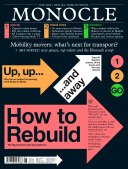
Issue 154
Monocle’s June issue will get you where you need to go. Our mobility special delivers reports on electric planes, dinky buses and the new Motor City. And once you’ve arrived at your destination, our art survey shows you the top talents to seek out around the world. Plus: how will Ukraine be rebuilt?
In This Issue
Oops! No content was found.
Looks like we no longer have content for the page you're on. Perhaps try a search?
Return Home

